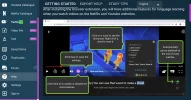I have a slightly different perspective on the duration of immersion. I have attended language schools several times in an immersion context, and found that only a single week was enough to yield a significant improvement in my skills. In fact, I confess I was delighted! I would recommend it to anyone.
Of course, as you hint, everyone is different.
Hello Karl! I have been waiting for someone to come along and say that ever since I wrote that post.

At various language schools, I have seen many, many one-week students come and go, and by and large, they made progress and are happy, with some wishing they could stay longer. I don’t doubt the validity of their - or your - opinions. And I don’t know if you have ever stayed longer at a school, but I have done both. I always learned something in a one week stay, but what I have found is that staying longer, say two weeks instead of one, doesn’t just double the experience, it also compounds it. From the perspective of staying a month, as I often have, that first week is just a blip.
I have also found that it takes me a week in country and in class just to get back up to functioning at my old level.
I do think level is a factor as well. If someone is a beginner and only knows ten words, when they learn ten new words, they are delighted. They have doubled their vocabulary. However, if you have a vocabulary of 5,000 words, learning ten more isn’t such a big deal. So a week of classes is going to tend to be more satisfying for lower level students than more advanced ones.
Another factor, of course, is that not everyone has the time and money to stay as long as they would like at a language school. I will point out for the benefit of anyone interested, that Mexico is significantly cheaper to travel in than Spain, and I would expect language schools are much cheaper there as well. Guatemala has quite a little industry of language schools of all sorts, often catering to the long-term backpacking crowd heading for months of travel in South America, and is cheaper still. I’d say about 50% less than Mexico, and that’s for private lessons, not groups as is standard elsewhere.
So, yes, I agree with you that everyone is different, but I would recommend to folks that they stay as long as they can at a school to get the most out of the experience.
































